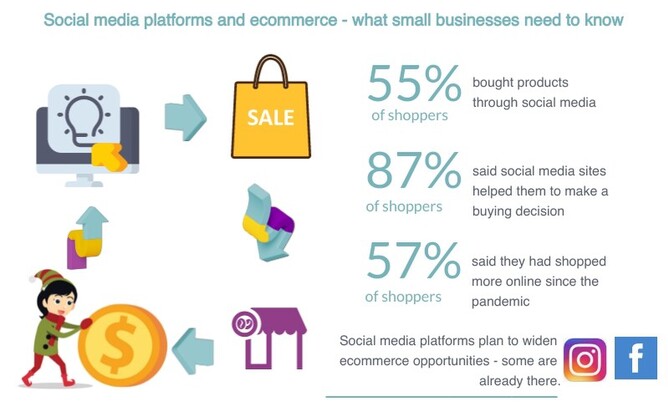Why should companies embrace social media? Understanding what, where and when to post can boost customer engagement, encourage sales and develop kudos for your company.
If social media is still an area that your business is yet to exploit, we've written a series of blogs to entice you to investigate.
A world without social media?
Curious Elf was feeling curious again this week (and her mind had wandered since there weren't any choccie biccies in the cupboard), what would the world look like now without social media?
Would we be conversing differently? Would our spelling have deteriorated? Would our little people have found a language other than text-speak? Whilst she was imagining a world where teenagers spoke rather than grunted, she also mused the social benefits of these sites. Has social media gained more leverage during the pandemic and served to provide a mental health service during multiple lockdowns?
But what of the business benefits of social media? Why should companies look to these platforms to promote their products and services? Is it really worth the effort?
Over a series of 3 blogs, Curious Elf will lead you through the marketing advantages of social media.
In this, our first blog, we’ll give you an introduction to social media and look at the reasons why you should incorporate it into your marketing strategy. With a little bit of guidance and a degree of discipline, the likes of Facebook, Twitter, LinkedIn, Instagram and many others, can really help you engage with your customer base and create loyalty and trust for your brand.
The second blog concentrates on the demographics 'Understanding your target audience and how they use social media'. Depending on your business and product, which sites should you be concentrating on? We also look at when’s the best time to post to gain maximum traction.
Curious Elf has also sought out the expert opinion of Sarah Pooley, the business brains behind The Digital Doctor. Between us, we’ve put together an FAQ which we hope asks those questions you’re itching to get the answers to. If there’s a question not covered in our third blog of the series, please do get in touch - Curious Elf is always curious!
Social media - what’s all the fuss about?
Let’s run through some of the statistics around social media and then tell Curious Elf that it’s not a marketing stream you want to get involved with.
In an article on Hootsuite ‘How to use social media for small business' it’s reported that there are over 4.2 billion social media users, globally - all of them are active and spend, on average, 2 hours, 25 minutes online every day.
That means an awful lot of minutes which can be turned into opportunities to:
- Create brand awareness.
- Develop relationships within your customer base (and beyond).
- Promote a direct sales channel.
In the UK the most active social network is YouTube (as at January 2021) with 78% of internet users engaging with the platform. Of those users, 33% reported that they watched video content once or more each day. Not only that, the data showed that there was no defining user income bracket - YouTube pretty much caters for every demographic. Hot on YouTube’s heels is Facebook - with 73%. For more data, search out statista.com: UK social network penetration.
Of the many social platforms that we can now access, it’s quite staggering to think that the average user has 8.4 social media accounts.
With a market so large, and so keen to search out content, it makes sense to delve further.
Why do people use social media?
According to Hootsuite’s article which Curious Elf cited earlier, people use social media for a number of reasons - Curious Elf was surprised to learn it wasn’t just about being nosey!
Reasons to access social media:
- To keep up to date with news and current affairs.
- To be entertained - fun content is more compelling.
- To be kept occupied - it gave users something to do.
- To network with family and friends.
- To share photos and videos.
- To shop - data from US Facebook users in June 2020 reports that 18.3% used the platform to make a purchase.
The social media online shopping statistics look set to continue an upward trend. Hootsuite's article reports that forecasts suggest channel growth will remain steady in 2021.
Facebook’s chief financial officer, David Wehner, said in their Q3 2020 earnings report:
“Looking ahead to 2021, we continue to face a significant amount of uncertainty. We believe the pandemic has contributed to an acceleration in the shift of commerce from offline to online, and we experienced increasing demand for advertising as a result of this acceleration.”
Curious Elf found the following infographic from business.yell.com to sum up the marketing potential:
If you'd like to learn more about when to post on which platform, then download our free guide:
When is the best time to post on social media according to industry.
We've broken it down by industry - so you know when's the best days to post and which ones to avoid, depending on the industry you're posting about.
Incorporating social media into your marketing plan
Curious Elf always starts with a plan, and at the very least, a list. She loves a list she does.
Ask yourself a few questions:
- What do you want to achieve - it’s not just about the likes. Be more discerning - do you want social media to give you more customers, greater conversion rates (i.e. more traffic to your website), more referrals? Sure, more followers, connects, shares and retweets mean you’ve created an interest but it’s action you’re really after.
- Do you want to increase brand awareness? Establish yourself as an expert, the go to person for the latest info and analysis?
- How are you going to know if your social media plan is going in the right direction? Establish how you’ll analyse the data.
- How do my competitors use social media? Curious Elf doesn't like a copy-cat, but there is sense in assessing other businesses in your target market.
Once you’ve looked at these questions it’s time to do some leg work:
- Conduct an audit of your current social media activity. Identify all the sites you currently use - and include those of other departments who also represent the company. Search on Google to make sure you’ve identified all the accounts. If you don’t have a business presence on a particular platform consider reserving your business name at this stage anyway.
- Now look at the company branding across the accounts - is it the same message across them all? Is the bio accurate and current? Do all the accounts link to your home page? Has your latest logo been uploaded to each account? Do you use the same handle for each platform?
- Assess your demographic - do you know who you want to reach through each channel? For example, Facebook is the fastest growing market in adults over 65. Understand your audience - current and prospective. Curious Elf says that 44% of users access social media to search and assess small business brands. Word of mouth principle applies here and you’d be daft to ignore a potential opportunity for business. By the way, our next blog covers demographics in more detail so take a look at 'Understanding your target audience and how they use social media'.
- Social media shoppers are a canny bunch too - a YouGov poll: Who has bought something because of a social media offer reported that of the 13% of British Facebook users who had used their account to make a purchase, most had made use of discounts, promotional codes, gift vouchers - if you want to attract customers look at the Calls To Action (CTAs) on your post - Facebook users will be on them like bees to a honey pot!
Market your business on social media
In this blog we given you a few thoughts to take away.
We've looked at the statistics and usage and given you reasons why incorporating social media posts into your marketing plan is a positive step.
Curious Elf has also suggested how to get that plan up and running and what actions you need to take to make the plan real and dynamic. Social media is a great place to promote your products and services and take it slowly - focus on 2 to 3 sites initially to assess your impact on your target audience.
In our next blog 'Understanding your target audience and how they use social media' we'll look at the demographics - that's the who uses what, why and when. So having decided which sites you're going to focus on, we'll tell you when's the best time to be active on social media.
The Digital Doctor can help you implement a digital marketing strategy
Want to learn more?
Want help producing a marketing plan which will use social media to your advantage?
Get in contact with us at The Digital Doctor. We can build a plan together and help to get you noticed.





